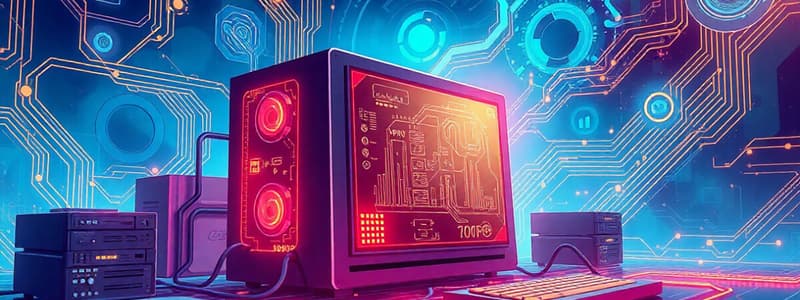Podcast
Questions and Answers
What is e-commerce?
What is e-commerce?
The buying or selling of goods or services over the internet.
What do social media platforms allow users to do?
What do social media platforms allow users to do?
Communicate and share content with each other.
What does hardware refer to?
What does hardware refer to?
All physical components of a computer that you can see, feel, and touch.
What is software?
What is software?
What is RAM?
What is RAM?
What does the Central Processing Unit (CPU) do?
What does the Central Processing Unit (CPU) do?
What is an operating system?
What is an operating system?
What is the purpose of spreadsheet processing applications?
What is the purpose of spreadsheet processing applications?
What does a Metropolitan Area Network (MAN) connect?
What does a Metropolitan Area Network (MAN) connect?
What does MBPS stand for?
What does MBPS stand for?
Which of the following components are required to connect to the internet?
Which of the following components are required to connect to the internet?
What is Wi-Fi?
What is Wi-Fi?
What is one advantage of using websites?
What is one advantage of using websites?
What is copyright?
What is copyright?
What is software privacy?
What is software privacy?
What is plagiarism?
What is plagiarism?
Study Notes
E-Commerce
- Buying and selling goods or services online.
Search Engines
- Websites or applications that help users find information online.
Social Media
- Platforms for users to connect and share content.
Desktops
- Personal computers for individual use.
Hardware
- Physical components of a computer.
Software
- Instructions that tell the hardware what to do.
RAM (Random Access Memory)
- Temporary memory used to process instructions.
Laser Printer
- Uses laser technology to print high-quality images and text.
ALU (Arithmetic Logic Unit)
- Part of the CPU that performs calculations and operations.
CPU (Central Processing Unit)
- Controls hardware devices in a computer.
System Software
- Software that manages and controls the computer's operations.
Operating System
- The most important system software that controls all operations.
Compressed Files
- Files with reduced sizes, often with extensions like .zip or .rar.
Spreadsheet Processing Applications
- Software designed for numerical calculations, data analysis, and organization.
Uses of Spreadsheets
- Personal budgets, to-do lists, invoices, payroll management, data analysis, surveys, test score analysis, and graph creation.
MAN (Metropolitan Area Network)
- Connects local networks within a city for fast data sharing.
Mbps
- Megabits per second, a unit of data transfer speed.
Internet Connectivity Requirements
- A computing device, networking components, and a data contract with an ISP.
Wi-Fi
- Wireless networking technology.
Advantages of Websites
- Instant access to information, easy and fast communication, convenient online shopping and banking, online job applications, unlimited entertainment, and online study resources.
Copyright
- A law protecting content owners from unauthorized copying of their work.
Software Privacy
- Illegal copying of someone else's work.
Plagiarism
- Presenting someone else's work as your own.
Studying That Suits You
Use AI to generate personalized quizzes and flashcards to suit your learning preferences.
Related Documents
Description
This quiz covers essential topics related to computers and e-commerce. Test your understanding of software, hardware components, and their functions within the context of online buying and selling. Dive into the basics of operating systems, memory, and printing technology.




